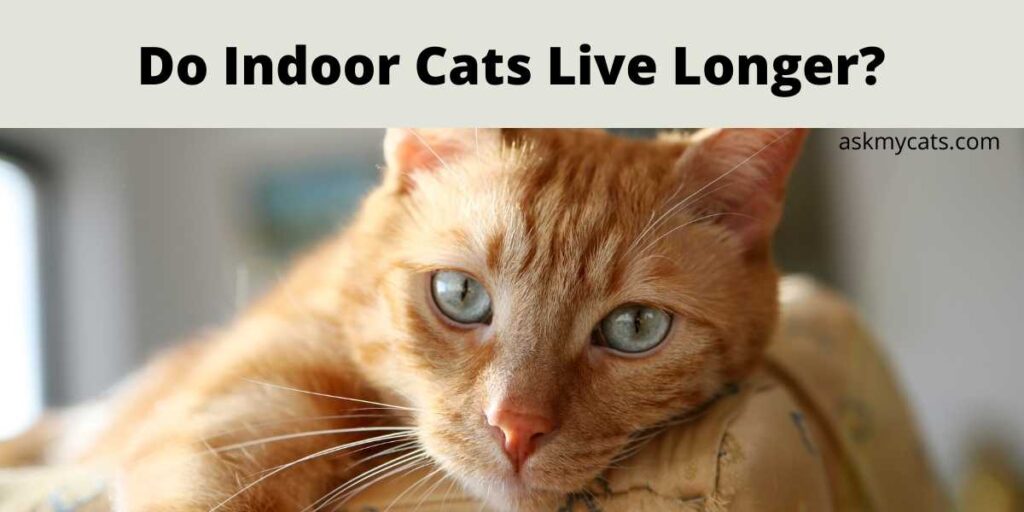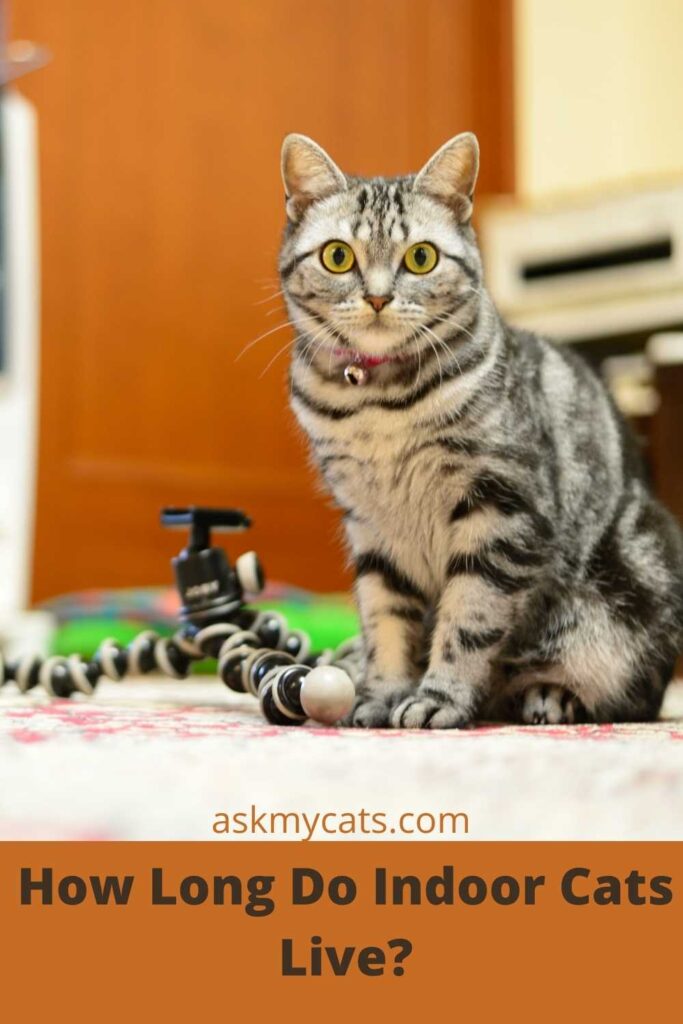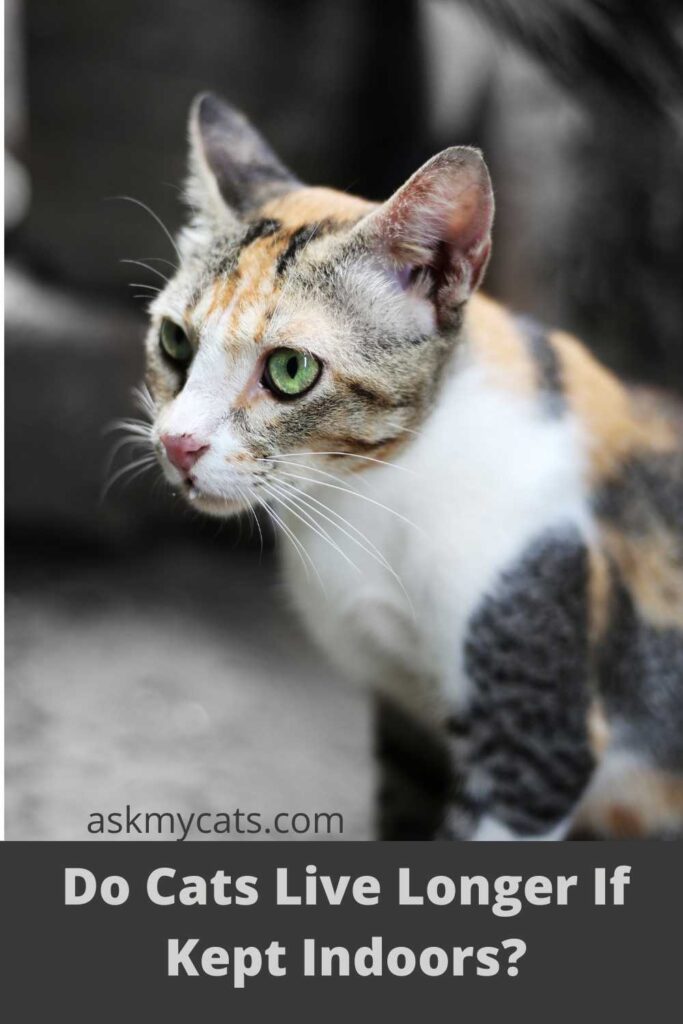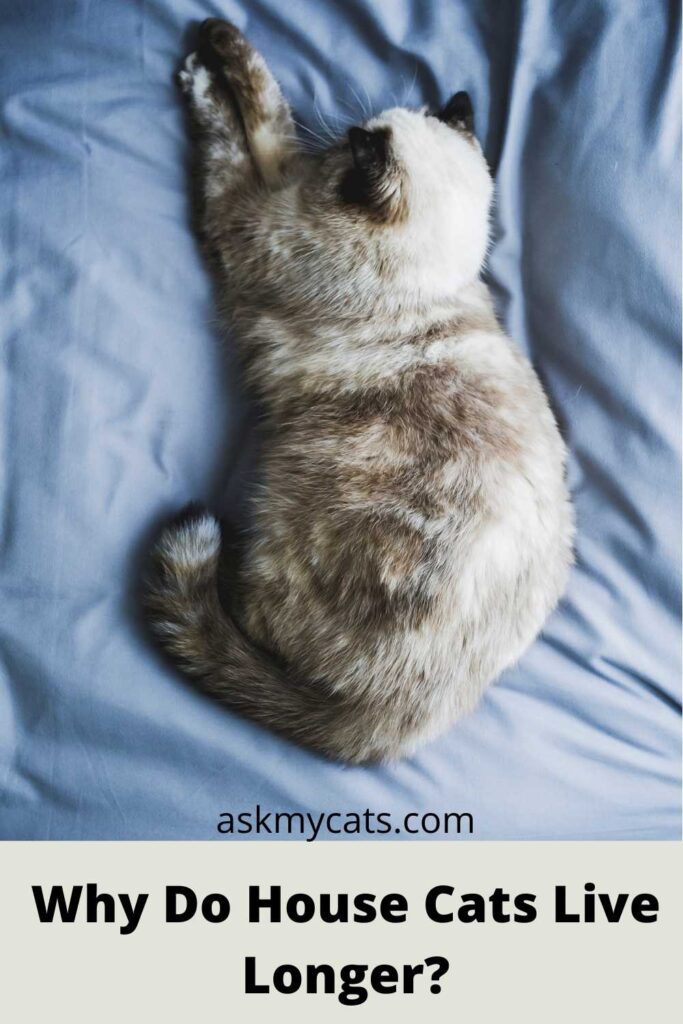Did you know- You don’t have to buy any specific breed of cat to have a cat live a long time? Feral cats brought and kept at home can serve the same purpose as well.
Yes, it’s an established fact that indoor cats live longer! Because of their better situation at home, the availability of food, etc., they have an extended life.
I mean, even people who have a shelter live longer than homeless men.
From how long they survive to why they survive for so long, we’ll tell you everything!
Check it out.


Give Your Cat the Perfect Day
Get the Free Ebook!
How Long Do Indoor Cats Live?

When we say that a cat has an average lifespan of 15 to 20 years, we mean it for indoor cats.
Cats that live outdoors survive for hardly 2 to 5 years.
Cats should be kept indoors, according to the consensus of the American Veterinary Medical Association, or AVMA.
Indoor cats typically live a little bit longer than outdoor cats since they don’t have to worry about predators or some of the other potential concerns associated with being outside.
Additionally, indoor cats typically consume a more balanced diet than outdoor cats, which can extend their lifespan.
Here are the pros and cons of outdoor cats:
Pros
- They get more exercise
- They receive more stimulation from the external environment
- Exposed to fresh air and sun rays
Cons
- Frequent accidents are reported
- They get lost quite often
- Pick up parasites
- Suffer from contagious cat diseases
These things drastically reduce a cat’s lifespan by a significant amount. Protect your cat and keep them inside the house.
Also, find out How Long Do Tabby Cats Live? Know About Tabby Cat Lifespan
Do Cats Live Longer If Kept Indoors?

As Shakespeare rightfully penned his thought, ”To be, or not to be, that is the question.”
For all practical reasons, cats have a longer lifespan if confined indoors.
Here are some risks faced by stray cats on the streets that increase their fatality rate:
- Frequently getting hit by cars.
- Animal Control may find wandering cats and euthanize them
- Animal cruelty.
- Acquiring a sickness.
- Cat fights can be extremely dangerous, as ill or unvaccinated cats can spread infections, particularly through bite wounds.
- Housecats that flee are at risk of being killed by other creatures like hawks, foxes, raccoons, etc.
- A cat that has been attacked may experience painful wounds or abscesses in addition to the potential for rabies exposure.
- Being trapped somewhere.
- Frostbites in winter.
- Outdoor-found parasites like fleas, ticks, and ear mites can make your cat itchy and miserable.
- Your outdoor cat will definitely have an unwanted litter if she or he hasn’t been spayed or fixed.
Interesting Read: Do Female Cats Live Longer Than Male Cats?
Do Indoor Cats Live Longer Than Outdoor Cats?
Cats are said to naturally stray outside. Is it really worth the risk, though, considering all the hazards that your beloved can face outside?
Keeping cats inside the house increases their chance of living longer than outdoor cats.
So what are the benefits and drawbacks of confining your cat?
Advantages
- Not getting into accidents
- Chances of getting lost are less
- No risk of getting attacked by dogs and other predators
- Not catching diseases spread by other cats
- Not getting fleas and other parasites
Disadvantages
- Getting bored easily
- Engaging in unwanted behavior
- Getting lethargic and becoming overweight
- Having separation anxiety
The drawbacks, however, do not outweigh the advantages. Even if your cat stays inside, you can take steps to prevent these adverse effects.
Also, check out How Long Do Fat Cats Live? Do Fat Cats Live Shorter Lives?
Are Indoor Cats Healthier Than Outdoor Cats?
If your cat stays inside the house, with proper availability of medical treatments, a safe shelter, a good diet, and protection from the adversities of the external environment, then what do you think? Will it be healthier than a feral cat?
Of course, indoor cats are healthier than outdoor cats!
Keep this in mind:
- An inactive lifestyle and an indoor cat diet involve grazing on an open dish of food all day, which can cause obesity in cats and increase their risk of developing diabetes.
- By offering scratching posts, perches, and a selection of toys to get them moving and climbing, you can encourage indoor cats to stay active.
- Fit your cat with a harness if they are determined to go outside. Your cat might actually love strolling with you once they get accustomed to it.
- Cat enclosures can be attached to home to offer cats the impression of being outside without the risks associated with being left unprotected from the outdoors.
Why Do House Cats Live Longer?

Although they enjoy the freedom to wander, outdoor cats can have a risky lifestyle.
Cats who are allowed outside run a higher risk of becoming hurt and coming into contact with contagious illnesses, including feline leukemia and feline immunodeficiency virus.
Try to keep any new cats you adopt inside at all times. Going from an indoor cat to an outdoor cat is considerably simpler than the reverse.
It’s challenging to convince cats to return inside after they’ve experienced their first taste of freedom.
House cats live longer due to the following factors:
1. Medical Treatment
Cats need to visit the vet on occasion. In order to ensure that your cat lives as long as possible, you should bring them in for inspection roughly once a year and take them to the doctor.
Check out signs of cat panic attacks, such as:
- Change in their activity level
- Change in their mood
- Avoiding their litter box
- Excessive meowing
- Aggression
2. Exercise
An indoor cat’s lifespan can be increased by maintaining a healthy weight, which can be achieved by regular exercise. Cats need to exercise for about 30 minutes every day.
3. Food Intake
Cats require a balanced diet with the proper amount of calories.
Your cat may develop food-related chronic disorders that can limit their lifespan if they consume too much or too little. A balanced diet also keeps your cat healthy, active, and content.
Cats need enough water in addition to a balanced diet to stay hydrated and maintain good bodily functions.
4. Healthy Teeth
To avoid tooth resorption (a condition that causes the teeth and their roots to break down, which can cause discomfort and muscle spasms) and other dental problems that could lower your cat’s quality of life, you should take your cat in for a dental cleaning at least once a year.
5. Cognition
Doing what you can to ward off diseases like dementia and other cognitive impairments might help your cat live a longer, more comfortable life.
Must Read: Do Outdoor Cats Live Longer?
Frequently Asked Questions
Is it okay to let indoor cats wander outside for better mental health?
Outdoor cats are more likely to experience unpleasant mishaps, be attacked by other animals, and develop tick and flea infestations that they subsequently bring indoors.
Ideally, get a cat enclosure to give it an idea of being outside. Preventing it from external hazards and ensuring a healthy lifestyle is the most you can do to give your cat a longer life. DO NOT take risks with it.
Get a leash and then accompany your cat for a walk- that’s a better option. Never let your pet walk out of the house alone. They are your responsibility, so be accountable for whatever happens to them.
Are indoor cats as happy as outdoor cats?
Cats, first and foremost, have distinct personalities that range widely. Take into account every single cat. Some felines really want to be outside, some people really don’t, whereas others don’t care.
Some cats are adamant about living outside and will always be unhappy if they can’t travel, while some adjust to internal existence and are perfectly pleased.
Since there isn’t exactly a clear solution, watch your cat’s behavior in each location and you might find one.
Do indoor cats feel lonely and long for friends?
Ask yourself things such as, “Is he a full-grown cat?” or “Do I work all the time or leave the city a lot?”
With kittens, the situation is different. They genuinely enjoy playing and require playmates. They do experience loneliness. However, if you spend a lot of time with an adult cat, he won’t mind little changes.
Your cat won’t experience loneliness if you are able to spend a lot of time with him every day. He won’t need a friend since they don’t like to compete for your love.
The majority of cats LOVE being the only one! But it is something you might want to think about if you never come home.
Final Words
You are ultimately responsible for deciding whether to keep your cat indoors or outdoors.
Make sure your cat is secure if you want it to remain outside by keeping up with all required vaccines, parasite prevention, and bringing your outdoor cat inside at night.
Indoor cats who have undergone spaying or neutering lead contented lives, enjoying the warmth of a windowsill and scaling cat towers.
And, with time and effort, outdoor cats can adjust to a happy indoor existence and double their lifespan!
Comment on whether you believe cats should just live indoors or should also be let outside.
You would also like to read why my cat doesn’t want to stay inside anymore
